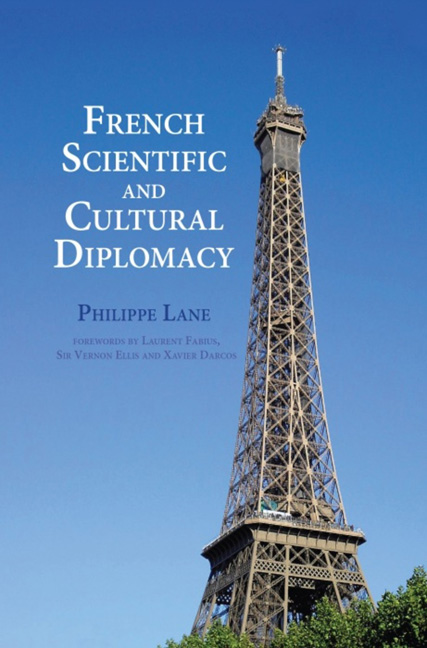Book contents
- Frontmatter
- Contents
- List of Tables
- List of Abbreviations
- Acknowledgements
- Foreword
- Foreword
- Foreword
- Introduction
- 1 French Foreign Cultural Activities: A Tradition with a Long History
- 2 Cultural and Scientific Action since 1995: Soft Power or Hard Power?
- 3 The Protagonists of Cultural and Scientific Diplomacy; 2011: A New Start
- 4 Cultural Diplomacy and the Arts
- 5 Science and University Diplomacy
- 6 Linguistic and Educational Cooperation
- 7 The Organization and Implementation of French Cultural and Scientific Activities Abroad
- Conclusion
- Index
Foreword
- Frontmatter
- Contents
- List of Tables
- List of Abbreviations
- Acknowledgements
- Foreword
- Foreword
- Foreword
- Introduction
- 1 French Foreign Cultural Activities: A Tradition with a Long History
- 2 Cultural and Scientific Action since 1995: Soft Power or Hard Power?
- 3 The Protagonists of Cultural and Scientific Diplomacy; 2011: A New Start
- 4 Cultural Diplomacy and the Arts
- 5 Science and University Diplomacy
- 6 Linguistic and Educational Cooperation
- 7 The Organization and Implementation of French Cultural and Scientific Activities Abroad
- Conclusion
- Index
Summary
There is more to the influence of a country than the strength of its economy, its strategic and military power and its place in the world institutions of governance. One must also consider how seductive are its ideas, its knowledge and its culture, and their relationship with the other factors of power.
Some would argue strongly that France is now in decline, with a weakening of its influence abroad. Such debates are often heated and sharply contested. The reality is more complex. The international influence of France is not in accord with its economic or demographic weight. Of course, new countries emerge on the international scene, themselves motivated by a just desire for international recognition and attraction, so crucial in the competition encountered in a divided world. Fully engaged in this competition, France enjoys a unique position the international community has always recognized.
This smart power, a new evolution of the soft power concept, is recognized as a power attribute of growing importance, and the foreign cultural and scientific policies of France are at the heart of its strategies to maintain influence around the world.
With the founding on 1 January 2011 of the Institut français, France has gained a new impetus to its foreign cultural policy. Succeeding, among others, to the Cultures France association, this new state organization was given a broader remit: to the dissemination and promotion of artistic exchanges were added the distribution of books, support for media resource centres and the French film industry, and the promotion of French thought and scientific knowledge, with help for French teaching – and training for those involved in this process.
The Institut français, a dedicated body answerable to the Ministry of Foreign Affairs, has a foreign cultural remit in the coordination of over 150 French Institutes throughout the world. It heads a network to unify action, crucial at a time of state budget reductions. The Institut français is developing a ‘single denomination’ policy similar to what has been the case for the British Council and the Goethe Institute over recent decades.
First through an initiative, shared with French schools abroad and the Alliances françaises, there is the promotion and diffusion of French, the second foreign language taught throughout the world after English – the only two languages used on every continent.
- Type
- Chapter
- Information
- French Scientific and Cultural Diplomacy , pp. xvi - xviiiPublisher: Liverpool University PressPrint publication year: 2013

